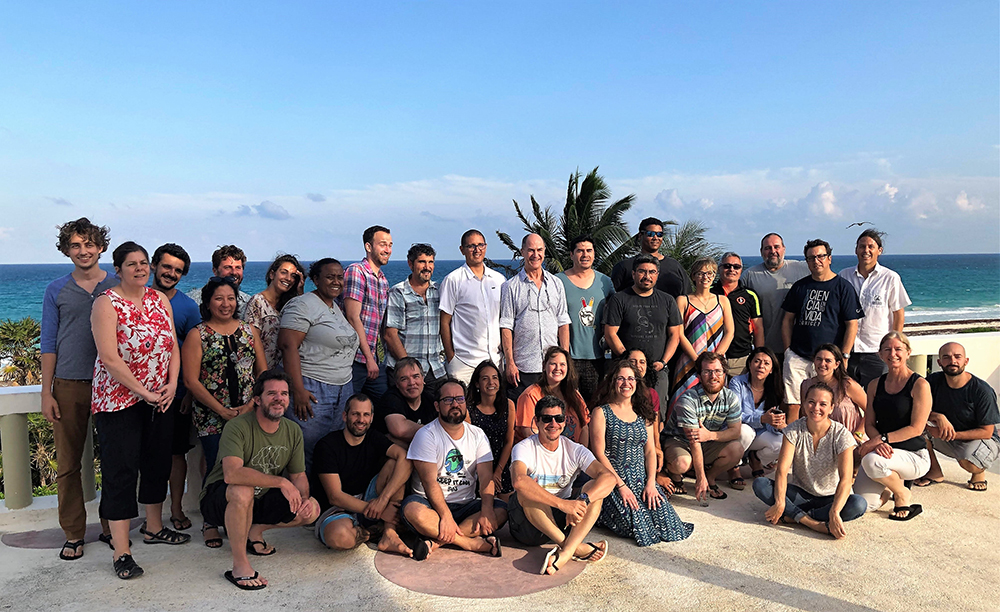Written by Sean Beckwith, Ph.D. grad student
PUERTO MORELOS, MEXICO – In sunny Puerto Morelos, on Mexico’s Yucatan Peninsula, 35 experts in marine ecology, satellite-remote sensing and data science gathered for the 2nd Marine Biodiversity Workshop: from the Sea to the Cloud. This activity is a step toward the implementation of the global Marine Biodiversity Observation Network (MBON), a thematic BON for the marine environment under GEO BON, the Group On Earth Observations Biodiversity Observation Network. The global MBON program is co-chaired by Dr. Frank Muller-Karger of the Institute for Marine Remote Sensing (IMaRS) at the USF College of Marine Science (USFCMS), Isabel Sousa-Pinto of the University of Porto (Portugal), and Mark Costello of the University of Auckland (New Zealand).
This year’s workshop saw the first fruits of the inaugural workshop held during the 2018 AmeriGEOSS Week in Sao Sebastiao, Brazil, organized by the MBON Pole to Pole Americas, a project implemented by Enrique Montes (USFCMS) as a stepping stone of the global MBON. Leveraging existing infrastructure managed by GEO BON, the Global Ocean Observing System (GOOS), and the Ocean Biogeographic Information System (OBIS), the MBON Pole to Pole Project is developing a Community of Practice across the Americas to assess marine biodiversity and ecosystem change using observations from field sampling and from satellites in space. The MBON Pole to Pole is a NASA-funded initiative under the Biological Diversity and Ecological Forecasting program that aims to support biodiversity information needs of AmeriGEO, the GEO node for the Americas, and the broader scientific and decision-making community as well as the general public.
One of the most beautiful aspects of the project is the diversity of minds that are gathered at the planning table. Tylar Murray, a data scientist in the IMaRS group who supported this activity, noted the enthusiasm and passion of the 12-nation strong group of participants, all of who are excited to be part of the network as a means to contribute information about the status and trends of marine biodiversity across the continents. The network, in turn, offers participants the advantage of pooling resources and making connections with scientists abroad to conduct large-scale, regional biodiversity assessments.
As a first step, the group of biodiversity scientists is focusing on rocky shores and sandy beaches. These two ecosystems are the most common coastal features and are accessible to scientists and managers throughout the Americas. The MBON Pole to Pole project is already generating and sharing invaluable data fully available to scientists and managers of living resources via the OBIS in support of Sustainable Development Goals (SDG’s) set by the United Nations for the 2030 Agenda.
Observations of biodiversity along rocky and sandy shorelines will pave the way to develop best practices for monitoring marine biodiversity. Montes, Principal Investigator of the MBON Pole to Pole, shared that the vision for the project is to catalog the biodiversity of coastal ecosystems along the east and west coast of the Americas and progressively expand offshore to the open ocean. The program also seeks to expand the use of data collected by satellite to understand how changes in oceanographic conditions drive coastal biodiversity.
The MBON Pole to Pole has started to organize a third Marine Biodiversity Workshop to be held in South America at the end of 2019 or early 2020 to consolidate the survey data collected by participants, ensure it is fully shared through OBIS, finalize case studies, and advance the overall goals of the program.
The workshop was financially supported by the MBON Pole to Pole, Universidad Nacional Autónoma de México (UNAM), and NOAA.
For more information, visit the workshop website and see the full report.
